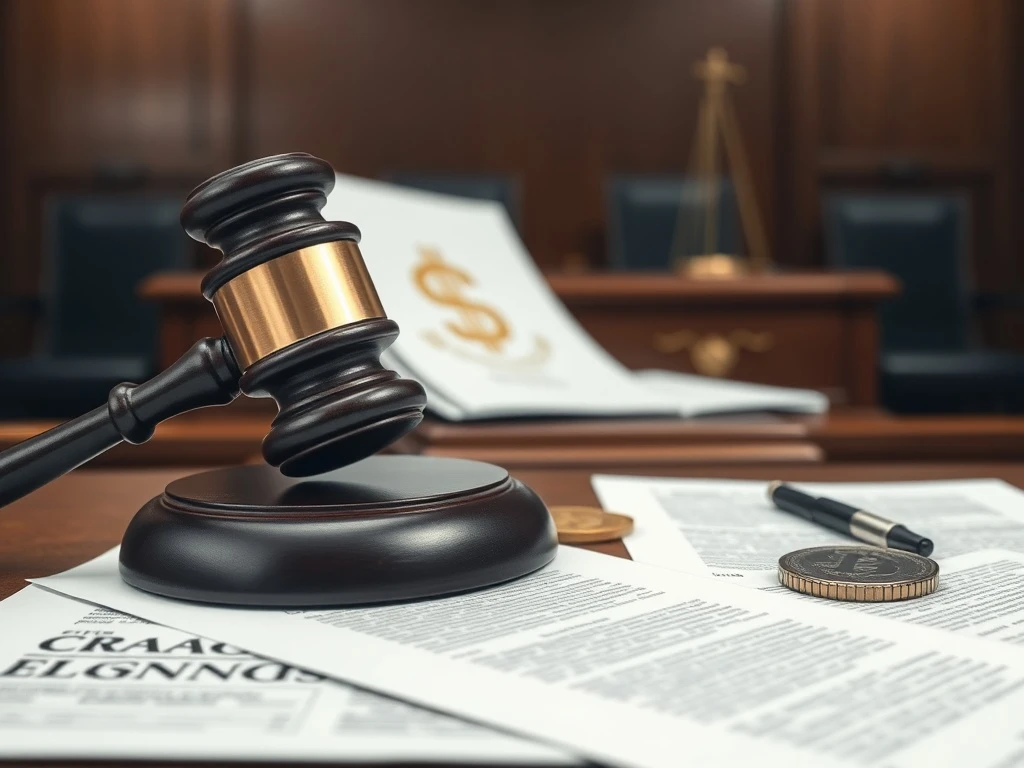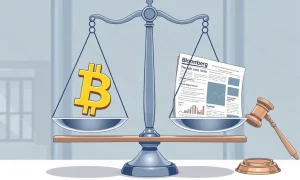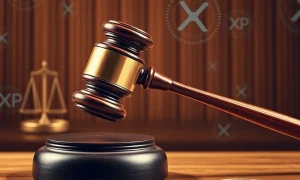The saga of FTX’s dramatic collapse continues to unfold in the courts. Now, former FTX customers are significantly strengthening their ongoing FTX lawsuit against Fenwick & West. This prominent law firm previously advised the now-bankrupt crypto exchange. Users claim new information reveals Fenwick & West played a pivotal role in the alleged fraud. This development is crucial for anyone interested in the intersection of law, finance, and cryptocurrency, especially those following the aftermath of major corporate failures.
New Allegations Emerge in the FTX Lawsuit
Customers of the defunct FTX crypto exchange seek to amend their class-action complaint against Fenwick & West. They assert that fresh details from Sam Bankman-Fried’s criminal trial and FTX’s bankruptcy proceedings provide compelling evidence. These new insights reportedly show the law firm was central to FTX’s devastating downfall. A recent court filing, submitted by FTX customers, highlights these assertions. It argues that the new evidence demonstrates Fenwick’s “key and crucial role” in the fraud’s execution.
Furthermore, the plaintiffs contend that the “FTX Fraud was only possible because Fenwick provided ‘substantial assistance’ by creating and approving the structures that allowed numerous frauds.” This grave accusation suggests direct complicity. The group specifically accuses Fenwick of agreeing to establish, manage, and represent “clearly conflicted companies.” These entities included FTX’s sister trading firm, Alameda Research, and its subsidiary, North Dimension. Importantly, these firms allegedly had no safeguards to prevent the billions of dollars that were admittedly stolen from customer accounts.
Prosecutors once described FTX’s fraud as one of the largest in U.S. history. This legal filing is part of a massive multi-district class-action FTX lawsuit. FTX users initiated this suit following the exchange’s collapse in late 2022. The litigation targets various parties, including the exchange itself, celebrities accused of promoting FTX, and multiple companies alleged to have collaborated with the firm.
Insights from Bankman-Fried’s Trial Impact the FTX Lawsuit
The proposed amended complaint claims that Sam Bankman-Fried’s criminal trial, which concluded last year, unearthed significant new information regarding Fenwick’s alleged assistance to FTX. During the high-profile proceedings, key FTX insiders testified against Bankman-Fried. These included FTX co-founder Zixiao “Gary” Wang, former Alameda CEO Caroline Ellison, and FTX’s ex-engineering director Nishad Singh. A jury ultimately found Bankman-Fried guilty on seven charges related to fraud and money laundering.
Nishad Singh’s testimony proved particularly damaging for Fenwick. He testified that he informed Fenwick of the misuse of customer funds, improper loans, and false representations. Moreover, Singh stated that Fenwick advised on how to facilitate and conceal these very acts. This direct testimony forms a critical piece of the new evidence. The customer group stated in a separate filing that it “has learned many more details on Fenwick’s relationship to FTX, based upon the interviews cooperation of the settled FTX Insiders.” This indicates a deeper understanding of the firm’s alleged involvement.
The original complaint against Fenwick, filed in August 2023, was met with denials and a motion to dismiss from the law firm. Fenwick & West has consistently denied the allegations. They argue that their conduct fell within the scope of client representation. However, the new details from the criminal trial present a significant challenge to this defense. The testimony of key witnesses under oath provides a detailed narrative of events, painting a clearer picture of the alleged fraudulent activities and the firm’s purported role. Consequently, the plaintiffs believe this strengthens their position considerably.
Bankruptcy Proceedings Uncover Further Connections
Beyond the criminal trial, investigations within FTX’s bankruptcy proceedings have also yielded crucial findings. The court handling FTX’s bankruptcy appointed an independent examiner. This examiner reviewed over 200,000 internal documents, many directly pertaining to Fenwick. The filing claims the examiner concluded that Fenwick was “deeply intertwined in nearly every aspect of FTX Group’s wrongdoing.” This finding is highly significant. It suggests a systemic involvement rather than isolated incidents.
According to the customer group, the examiner found Fenwick had “exceptionally close relationships” with FTX’s executive team. Furthermore, the firm allegedly “facilitated conflicted intercompany transactions that misused customer assets.” These transactions are central to the fraud claims. The examiner also accused Fenwick of creating shell companies “to obscure asset movements.” This practice is often associated with illicit financial activities. Additionally, Fenwick was allegedly behind implementing auto-deleting messages sent between FTX executives via the encrypted messaging app Signal. This particular detail suggests an intent to conceal information from regulators and investigators.
The group accused Fenwick of implementing “other concealment practices that regulators and prosecutors later cited as obstruction.” They further claimed the law firm “knew that these actions would mislead investors and regulators.” These findings from the independent examiner’s report provide a robust factual basis for the amended FTX lawsuit. They suggest a deliberate strategy to evade oversight. Therefore, the plaintiffs argue, Fenwick’s actions extended far beyond standard legal advice.
New Securities Claims Added to the FTX Lawsuit
The proposed amended complaint also introduces two new state law claims. These claims accuse Fenwick of violating securities laws in Florida and California. The focus of these new claims is FTX’s proprietary cryptocurrency, FTX Token (FTT). The customer group alleges that Fenwick played “an active role in designing, promoting, and facilitating the sale” of FTT. They also include yield-bearing accounts offered by FTX and “interests in other FTX-controlled instruments” in these allegations. The plaintiffs assert that these offerings were unregistered securities, sold illegally to investors.
This addition is particularly important for the evolving legal landscape of cryptocurrencies. It directly addresses the classification of certain crypto assets. Fenwick, in its motion to dismiss the previous complaint filed in September 2023, argued it cannot be held accountable for aiding a client’s wrong as long as its “conduct falls within the scope of the representation of the client.” This defense hinges on the traditional attorney-client privilege and the limits of liability for legal advisors. However, the new securities claims broaden the scope of Fenwick’s alleged liability, moving beyond mere assistance to direct involvement in potentially illegal offerings.
It is worth noting that the customer group had also sued Sullivan & Cromwell, another law firm contracted by FTX. They accused Sullivan & Cromwell of helping the exchange facilitate its fraud. However, the plaintiffs later dropped that complaint due to a lack of sufficient evidence. This highlights the rigorous evidentiary standards required in such complex legal battles. The fact that the FTX lawsuit against Fenwick is being bolstered, rather than dropped, underscores the perceived strength of the new evidence against them.
Implications for the Legal and Crypto Industries
The ongoing FTX lawsuit against Fenwick & West carries significant implications for both the legal profession and the broader cryptocurrency industry. For law firms, it serves as a stark reminder of the potential liabilities when advising clients in nascent and rapidly evolving sectors like crypto. The line between providing legal counsel and allegedly facilitating illicit activities can become blurred, leading to severe legal repercussions. This case could set precedents regarding the scope of attorney responsibility in the digital asset space.
For the crypto industry, the lawsuit further emphasizes the ongoing regulatory scrutiny and the need for greater transparency and compliance. The allegations of creating shell companies, facilitating conflicted transactions, and implementing communication concealment practices highlight the systemic issues that contributed to FTX’s downfall. As regulators worldwide continue to grapple with how to supervise digital assets, cases like this underscore the importance of robust legal frameworks and ethical conduct from all parties involved, including professional service providers.
The legal proceedings are expected to be protracted and complex. Fenwick & West will undoubtedly continue to mount a vigorous defense. However, the plaintiffs’ bolstered claims, armed with new evidence from high-profile trials and bankruptcy investigations, indicate a determined effort to hold all alleged facilitators of the FTX fraud accountable. The outcome of this particular FTX lawsuit will be closely watched, as it could reshape how legal firms operate within the cryptocurrency sector and how victims of large-scale financial frauds seek justice.
The legal battle surrounding FTX’s collapse continues to unfold. This specific FTX lawsuit against Fenwick & West marks a significant chapter. It underscores the far-reaching consequences of the exchange’s alleged fraud. As new evidence emerges, the focus intensifies on all parties who may have contributed to one of crypto’s most infamous downfalls. The pursuit of accountability remains a top priority for the affected customers.
Frequently Asked Questions (FAQs)
What is the core accusation in the FTX lawsuit against Fenwick & West?
The core accusation is that Fenwick & West, a law firm, provided “substantial assistance” to the FTX fraud. They allegedly created and approved structures that allowed for the misuse of customer funds and facilitated conflicted transactions.
What new evidence is bolstering the FTX lawsuit?
New evidence comes from two main sources: testimonies from Sam Bankman-Fried’s criminal trial, particularly Nishad Singh’s claims, and findings from an independent examiner in FTX’s bankruptcy proceedings. This evidence suggests Fenwick was deeply intertwined with FTX’s alleged wrongdoing.
Who is Nishad Singh, and what did he testify?
Nishad Singh was FTX’s ex-engineering director. He pleaded guilty and testified against Sam Bankman-Fried. Singh claimed he informed Fenwick of the misuse of customer funds and that the firm advised on how to facilitate and hide these acts.
What are the new securities claims against Fenwick & West?
The amended complaint adds two new state law claims (Florida and California) accusing Fenwick of violating securities laws. It alleges the firm played an active role in designing and promoting the sale of FTX Token (FTT) and other FTX-controlled instruments, which plaintiffs claim were unregistered securities.
How has Fenwick & West responded to these allegations?
Fenwick & West has denied the allegations and previously moved to dismiss the complaint. They argue that their conduct fell within the scope of representing their client, implying no liability for the client’s alleged wrongdoings.
Why is this FTX lawsuit significant for the crypto industry?
This lawsuit is significant because it could set precedents for law firm liability in the crypto sector. It highlights the increasing scrutiny on professional service providers in the digital asset space and emphasizes the need for robust compliance and ethical conduct.
























